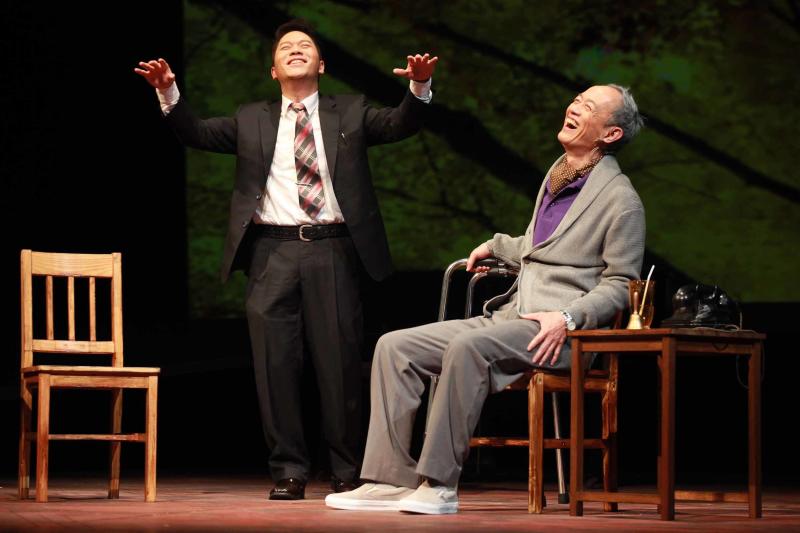Mandarin stage version of Tuesdays With Morrie is funny and poignant
Sign up now: Get ST's newsletters delivered to your inbox

Actors Pu Hsueh-liang (left) and King Shih-chieh in the Mandarin stage version of Tuesdays With Morrie.
PHOTO: GODOT THEATRE COMPANY
SINGAPORE - Mitch Albom's best-selling memoir Tuesdays With Morrie (1997) ranks alongside Paulo Coelho's The Alchemist (1988) as one of the most popular reads for fans of self-help books.
But while these are often weighed down by didactism and feel-good platitudes, director Daniel Yang's Mandarin stage version of Albom's book is thankfully more than the sum of its parts.
The funny and poignant two-man play by Taiwan-based Godot Theatre Company ran at The Esplanade from last Friday to Sunday (July 22). It was translated into Mandarin from Jeffrey Hatcher and Albom's stage adaptation.
Tuesdays With Morrie is based on a series of meetings between sports journalist Mitch, and his former sociology professor who had ALS, a motor-neurone disease that causes the muscles to waste away.
In the few months Morrie has left to live, Mitch meets him every Tuesday at his house where they talk about life, love, ageing and death.
Yang's production, which premiered in Taipei seven years ago, stars theatre stalwart King Shih-chieh as Morrie and television actor Pu Hsueh-liang as Mitch.
King is endearing in his role, while Pu is a likeable if slightly self-conscious Mitch.
In some ways, Yang's play, which features a minimalist set against the backdrop of a maple tree, is an improvement on Albom's book.
It does not take itself too seriously, leavening the heavy themes of Albom's memoir with irreverent banter and jokes about urine and backside-wiping. (But there are times when the humour gets a bit excessive, the characters at risk of becoming caricatures of themselves.)
Yang's production is for the most part engaging and thought-provoking, encouraging the audience to re-think their notions of success.
Mitch has a high-profile job, two cars and a house in the suburbs. But he is also caught in the rat race, distracted from the things in life - love, family - that truly matter.
Asked how he thinks he will die, he imagines dropping dead at his computer while rushing out a column. All the editor does is pass it to another reporter who gets it done by press time.
When Morrie asks Mitch, "Are you at peace with yourself?", we wonder the same of ourselves too.
Yang's production demands that audience members give something of themselves while watching it. (Pu, in an earlier interview, described the audience as "third actors" in this two-man play.)
The most powerful scenes are the ones that are fuelled by the intensity of our own experiences, or at least those of people we know - be it Mitch's inability to accept weakness in his heroes, or Morrie losing control of his fork while trying to eat a bowl of egg salad.
Tuesdays With Morrie does what any good teacher does, which is repeat the key messages again and again until they sink in. Unfortunately, this led to some members of the audience growing restless in the latter half of the play.
Even though we see Mitch evolve, at some point it feels like the actors are dishing out more of the same - the affable Morrie with his words of wisdom; Mitch and his comic exasperation.
The play demands that we be kinder to those around us and open our hearts to them, making it difficult to write off lines such as "Once you learn how to die, you learn how to live," and "When you die, you're not really gone" as simplistic without feeling a twang of guilt.
Still, Tuesdays With Morrie might have been more compelling had it experimented with more ways of showing rather than telling.
The best lessons, after all, are the ones where we learn to fumble around till we arrive, bruised and triumphant, at our own conclusions.
REVIEW / THEATRE
TUESDAYS WITH MORRIE
Godot Theatre Company
Esplanade Theatre
Saturday (July 21)


